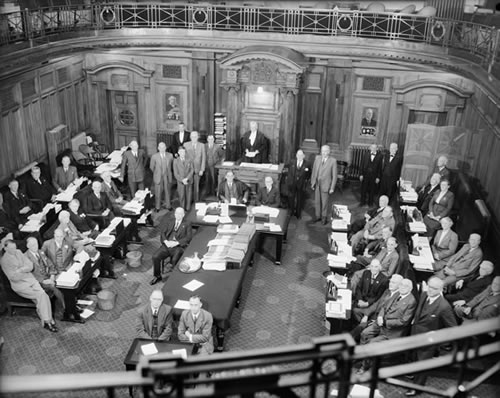See historic events for any day of the year by entering the date below. Why not try your birthday?
Sound: the end of the Legislative Council

This is the final gathering of the Legislative Council, 1 December 1950.
The last Legislative Council, appointed in 1950, was known as the 'suicide squad'. Its 25 new members were appointed by the National government to make sure that the Legislative Council Abolition Bill was passed. It did, and the council sat for the final time on 1 December 1950 (the legislation came into effect on 1 January 1951). No one was too upset at its demise, and few people came to watch its last moments. At the very end, just before 6 p.m., the council members linked arms in the centre of the chamber, sang 'Auld lang syne' and the national anthem, and filed out of the chamber.
Alexander Turnbull Library,
ArchNZ, National Publicity Studios collection
Reference: , F19120 1/2
Further information and copies of this image may be obtained from the Library through its 'Timeframes' website, http://timeframes.natlib.govt.nz
Permission of the Alexander Turnbull Library, National Library of New Zealand, Te Puna Matauranga o Aotearoa must be obtained before any reuse of this image.
Hear Charles Wheeler describe the end of the Legislative Council.
This clip requires Flash Player 7 or higher. Download latest Flash Player
Click on arrow to play (280kb).
Charles Wheeler, longstanding press gallery reporter from the turn of the 20th century and parliamentary commentator, describes the role of the Legislative Council and its abolition in 1950.
Transcript
With the passing of the old year, New Zealand loses one of its legislative chambers. During the whole period of representative government we've had two branches of the legislature. One an elected House of Representatives and the other, this disappearing institution, the Legislative Council whose members were nominated by the government of the day, first for life and then later for seven-year periods. This change is a constitutional revolution, but it was made quietly. British people can do drastic things without riotous demonstrations. When Mr Holland, as leader of the Opposition, introduced a bill to abolish the Legislative Council, only a few interested in constitutional questions showed much concern. Private Members' Bills rarely got far in Parliament, but Mr Holland's opportunity came within a year, when as head of the government, he could try again with the certainty he'd succeed. But council has been unobtrusive or, should I say, unassertive for years. Newspapers neglected it and the average man hardly knew it existed. If the threatened institution had many friends, Parliament would have been bombarded with resolutions and petitions to save it. Nothing of the sort happened, and now the Legislative Council is no more. Its handsome meeting place, with marble pillars, bronze railings and red plush benches for the members, beauty and comfort combined, is empty and silent.
Sound Archives/Nga Taonga Korero, Copyright © Radio New Zealand
From The end of the Legislative Council by Charles E. Wheeler, about 1951
Reference: D655

 Delicious
Delicious StumbleUpon
StumbleUpon Reddit
Reddit Facebook
Facebook Google
Google Yahoo
Yahoo


Community contributions